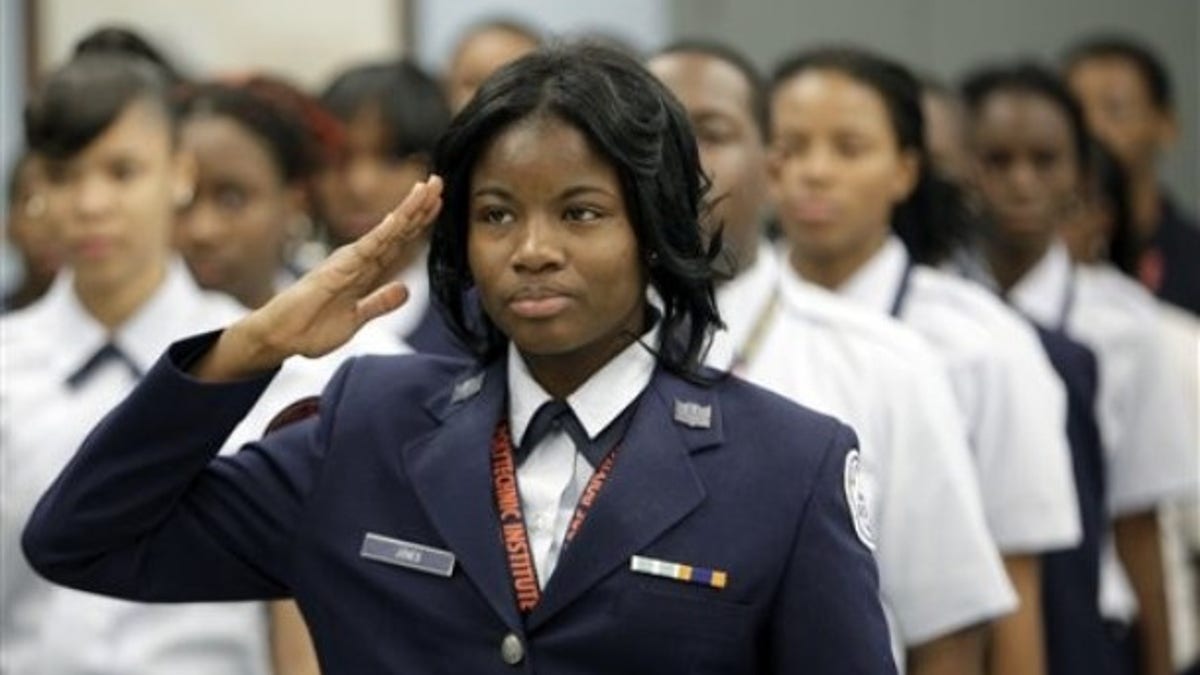
Nov. 12, 2009: Baltimore Polytechnic Institute Air Force Junior ROTC cadet Kwameka Jones salutes before her squad practiced drills. (AP)
The congressional repeal of the military's ban on gays serving openly has led some of the nation's most prestigious universities to consider ending their decades-old standoff with the Pentagon's ROTC program.
Several elite schools signaled their desire to reinstate the Reserve Officer's Training Corps after the Senate voted on Saturday to overturn the military's "don't ask, don't tell" policy, a repeal that President Obama is slated to sign into law on Wednesday.
Drew Faust, president of Harvard University and daughter of a decorated World War II veteran, said she will soon begin talking with military officials about welcoming back ROTC.
"I look forward to pursuing discussions with military officials and others to achieve Harvard's full and formal recognition of ROTC," she said in a written statement posted on the university's website. "I am very pleased that more students will now have the opportunity to serve their country."
The Pentagon did not respond to an e-mail seeking comment.
Nearly 300 colleges and universities currently host the 200-year-old ROTC program, which often covers a student's full tuition in exchange for a fixed period of active and inactive military service after graduation.
But Harvard was among dozens of prestigious schools that eliminated the program in the early 1970s after students and professors protested teaching the art of war on college campuses. Several of the same schools kept the ban in place in opposition to the Pentagon's "don't ask, don't tell' policy, which was enacted in 1993.
Other elite schools, including Columbia and Stanford, also hinted that they now would be willing to extend open arms to the military.
"We now have the opportunity for a new era in the relationship between universities and our military services," Columbia University President Lee Bollinger said in a written statement.
Bollinger said the repeal "effectively ends what has been a vexing problem for higher education, including at Columbia – given our desire to be open to our military, but not wanting to violate our own core principle against discrimination on the basis of sexual orientation."
Bollinger has previously said that bringing back the ROTC is a matter of the University Senate to consider and an issue that will be taken up in the new year by the university's Council of Deans.
Richard Levin, president of Yale University, said the school is "eager" to begin discussions about lifting the ban on ROTC.
The university will be discussing the matter with the faculty in the spring semester, and school officials will consult with the Pentagon early in the new year to determine the military's interest in establishing an ROTC unit at Yale, he said in a statement posted on the school's website.
"We are very hopeful that these discussions will enable us to begin a new chapter in the long history of Yale's support of the U.S. Armed Services," he said.
Stanford has yet to go as far as the others schools in embracing the military.
Stanford spokeswoman Lisa Lapin told FoxNews.com that the repeal is a "major factor" in an ongoing review by its faculty committee but not the only issue, as there are some academic concerns that need to be addressed. The committee will vote sometime in the spring on whether to reinstate ROTC, she said.
Brown university didn't respond to a request for comment. But the school's spokeswoman, Marisa Quinn, told Insider Higher Ed that academic issues are also a concern for officials considering reinstating the program.
"Those issues are matters for faculty discussion," Quinn told the magazine. "Any academic issues raised by a potential return of ROTC instruction at Brown would require a vote of the faculty."




